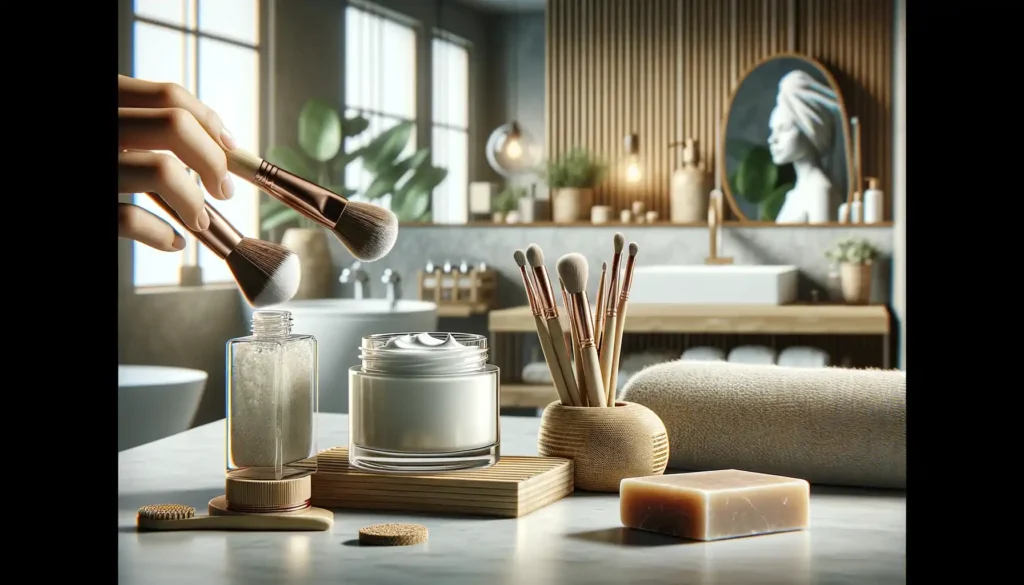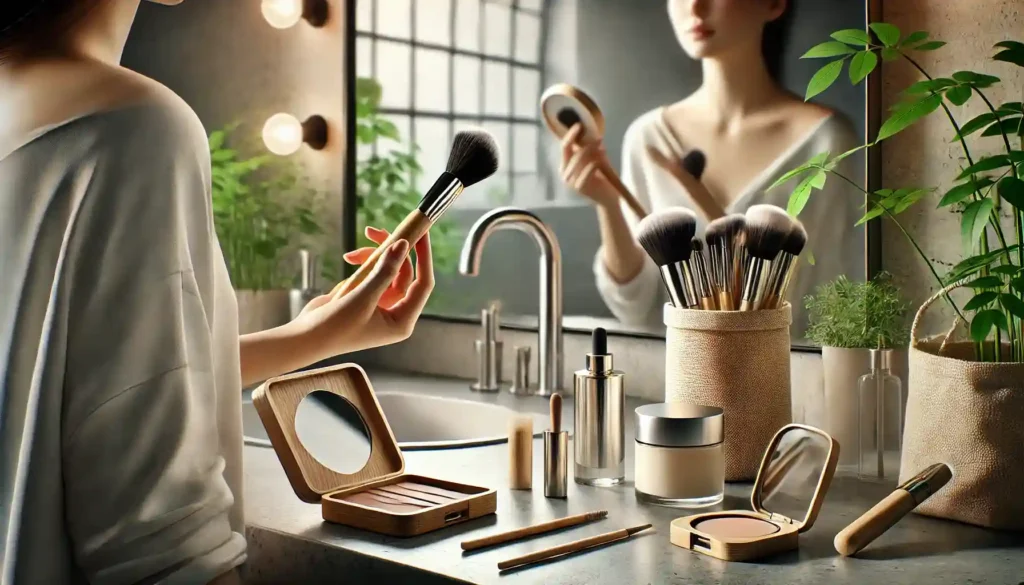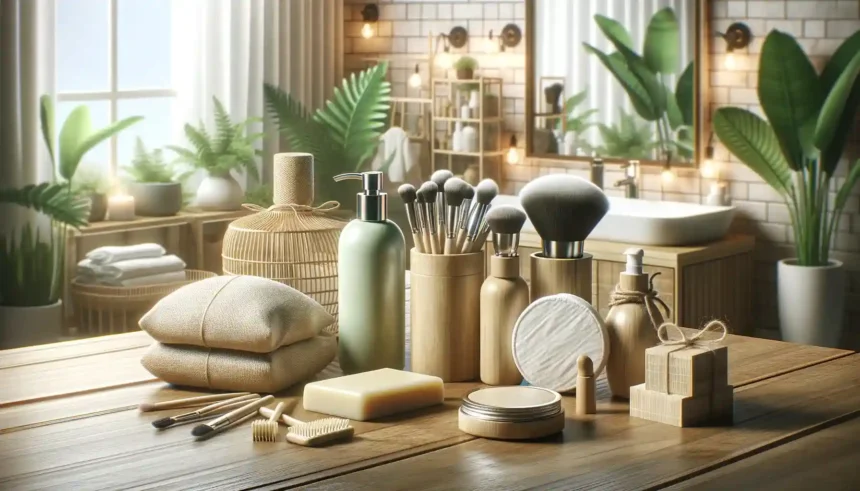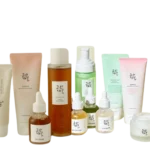Zero-waste beauty is transforming the beauty industry by promoting sustainable practices in skincare and makeup. By minimizing waste and using eco-friendly products, zero-waste beauty aims to reduce the environmental impact of beauty routines. Zero-waste beauty emphasizes sustainability, natural ingredients, and environmentally responsible packaging.
“The beauty industry has the power to be a leader in sustainability by embracing zero-waste practices.” – Tata Harper, founder of Tata Harper Skincare.
Tata Harper highlights the potential for the beauty industry to lead in sustainability through zero-waste initiatives.

What is Zero-Waste Beauty?
Zero-waste beauty involves using products and practices that produce little to no waste. This includes choosing products with minimal packaging, using reusable and recyclable materials, and opting for natural and organic ingredients. Zero-waste beauty focuses on sustainability and environmental responsibility in all aspects of beauty routines.
Key Principles of Zero-Waste Beauty
- Minimal Packaging: Using products with minimal or no packaging, or packaging that is recyclable or compostable.
- Natural Ingredients: Choosing products made from natural, organic, and non-toxic ingredients.
- Reusable Tools: Opting for reusable beauty tools such as bamboo makeup brushes and stainless steel razors.
- DIY Products: Making your own beauty products at home to reduce packaging and control ingredients.
“Zero-waste beauty is about making mindful choices that are good for your skin and the planet.” – Anne-Marie Bonneau, the Zero-Waste Chef.
Anne-Marie Bonneau emphasizes the importance of making sustainable and mindful beauty choices.

Benefits of Zero-Waste Beauty
Adopting a zero-waste beauty routine offers numerous benefits for the environment, your health, and your wallet. Zero-waste beauty can help reduce your carbon footprint, improve skin health, and save money in the long run.
Environmental Benefits
Zero-waste beauty significantly reduces the environmental impact of beauty products.
- Less Plastic Waste: Reduces the amount of plastic packaging that ends up in landfills and oceans.
- Sustainable Sourcing: Encourages the use of sustainably sourced ingredients and materials.
- Lower Carbon Footprint: Decreases the carbon footprint associated with manufacturing and transporting beauty products.
Health Benefits
Using natural and organic beauty products can improve skin health and reduce exposure to harmful chemicals.
- Non-Toxic Ingredients: Avoids synthetic chemicals and preservatives that can irritate the skin.
- Better for Sensitive Skin: Natural ingredients are often gentler and better suited for sensitive skin.
- Improved Skin Health: Natural and organic products nourish the skin with beneficial vitamins and minerals.
Financial Benefits
Zero-waste beauty can be cost-effective by reducing the need for frequent purchases and encouraging DIY solutions.
- Reusable Products: Investing in reusable tools and containers can save money over time.
- DIY Beauty: Making your own beauty products at home can be cheaper than buying commercial products.
- Long-Lasting: High-quality, sustainable products tend to last longer, reducing the need for replacements.
“Zero-waste beauty not only benefits the environment but also offers healthier options for your skin.” – Dr. Whitney Bowe, dermatologist and author.
Dr. Whitney Bowe highlights the dual benefits of zero-waste beauty for both the environment and skin health.
Popular Zero-Waste Beauty Brands
Several beauty brands are leading the way in zero-waste beauty by offering sustainable and eco-friendly products. Here are some well-known zero-waste beauty brands that prioritize sustainability.
Lush
Lush is known for its commitment to ethical and sustainable practices, offering a range of zero-waste beauty products.
- Signature Products: Solid shampoo bars, naked shower gels, and packaging-free skincare.
- Sustainable Practices: Uses natural ingredients, minimal packaging, and ethical sourcing.
Ethique
Ethique produces solid beauty bars that are free from plastic packaging, focusing on sustainability and eco-friendly ingredients.
- Signature Products: Solid face cleansers, body washes, and hair care bars.
- Eco-Friendly Packaging: Uses compostable and recyclable packaging for all products.
Meow Meow Tweet
Meow Meow Tweet offers vegan, cruelty-free skincare products with a strong focus on zero-waste packaging.
- Signature Products: Deodorant sticks, facial oils, and soap bars.
- Sustainable Packaging: Uses compostable, recyclable, and reusable packaging materials.
Herbivore Botanicals
Herbivore Botanicals creates natural skincare products with an emphasis on sustainability and minimal waste.
- Signature Products: Facial oils, clay masks, and bath salts.
- Eco-Conscious Packaging: Uses glass containers and minimal plastic packaging.
“Brands like Lush and Ethique are setting a high standard for zero-waste beauty products.” – Kathryn Kellogg, author of “101 Ways to Go Zero Waste.”
Kathryn Kellogg praises the efforts of leading brands in promoting zero-waste beauty.

Tips for Transitioning to Zero-Waste Beauty
Making the switch to this beauty routine can be simple and rewarding with the right approach. Here are some tips to help you transition to zero-waste beauty.
Start Slow
Begin by incorporating a few zero-waste products into your routine and gradually make more changes.
- Replace One Product at a Time: Swap out your current products for zero-waste alternatives as you finish them.
- Research Brands: Look for brands that align with your values and offer sustainable products.
DIY Beauty Products
Making your own beauty products at home can reduce waste and allow you to control the ingredients.
- Homemade Face Masks: Use ingredients like honey, oatmeal, and avocado for nourishing face masks.
- DIY Scrubs: Make body scrubs with sugar or coffee grounds and natural oils.
- Reusable Containers: Store your DIY products in reusable glass or stainless steel containers.
Choose Reusable Tools
Opt for reusable beauty tools that minimize waste and are made from sustainable materials.
- Bamboo Brushes: Use makeup brushes with bamboo handles and synthetic bristles.
- Stainless Steel Razors: Replace disposable razors with a durable stainless steel safety razor.
- Reusable Cotton Pads: Use washable cotton pads instead of single-use ones.
Support Zero-Waste Brands
Support brands that prioritize sustainability and offer zero-waste products.
- Eco-Friendly Packaging: Look for products with compostable, recyclable, or minimal packaging.
- Sustainable Ingredients: Choose products made with natural, organic, and ethically sourced ingredients.
- Refillable Options: Opt for brands that offer refillable products to reduce packaging waste.
“Transitioning to zero-waste beauty is a journey, and every small change makes a difference.” – Bea Johnson, author of “Zero Waste Home.”
Bea Johnson encourages taking small steps towards a zero-waste beauty routine.
The Future of Zero-Waste Beauty
The future of it looks promising as more consumers demand sustainable and eco-friendly products. It is expected to become increasingly popular and widely adopted.
Innovative Packaging Solutions
Advancements in packaging technology will continue to reduce waste and improve sustainability.
- Biodegradable Packaging: Development of packaging materials that break down naturally.
- Refill Stations: More brands offering refill stations to reduce single-use packaging.
- Zero-Waste Stores: Growth of zero-waste stores where customers can purchase products without packaging.
Increased Consumer Awareness
Growing awareness of environmental issues will drive demand for these beauty products.
- Eco-Conscious Consumers: More people choosing products that align with their sustainability values.
- Educational Campaigns: Brands and organizations educating consumers about the benefits of zero-waste beauty.
- Social Media Influence: Influencers and activists promoting zero-waste beauty practices.
Regulatory Support
Government regulations may support the shift towards it by encouraging sustainable practices.
- Banning Single-Use Plastics: Policies to reduce or ban single-use plastics in beauty packaging.
- Incentives for Sustainable Brands: Financial incentives for brands that adopt sustainable practices.
- Standardized Labeling: Clear labeling to help consumers identify zero-waste and eco-friendly products.
“The shift towards zero-waste beauty is not just a trend but a necessary step towards a sustainable future.” – Lauren Singer, founder of Trash is for Tossers.
Lauren Singer emphasizes the importance of adopting zero-waste beauty for a sustainable future.
Understanding Sustainable Beauty offers insights into starting and maintaining a sustainable beauty routine. For more tips on eco-friendly skincare, visit Eco-Friendly Skincare Tips. Discover additional strategies for reducing waste in our waste reduction section. Learn more about DIY beauty products with our guide to homemade skincare. For more information on zero-waste beauty, visit the Zero Waste International Alliance. To explore sustainable beauty products, check out Sustainable Beauty Association. For additional resources, see Eco Beauty Directory.















